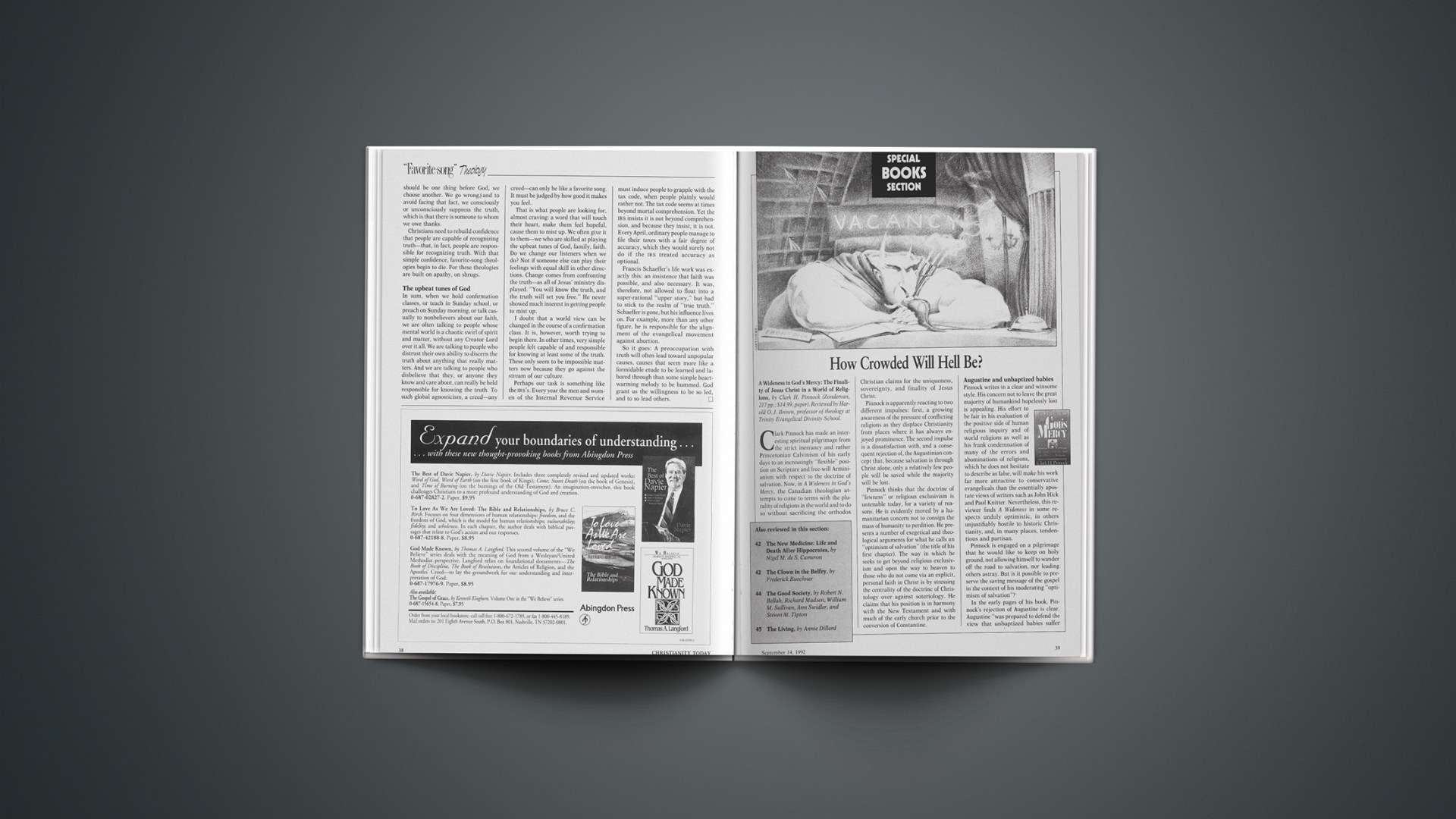A Wideness in God’s Mercy: The Finality of Jesus Christ in a World of Religions,by Clark H. Pinnock (Zondervan, 217 pp.; $14.99, paper). Reviewed by Harold O. J. Brown, professor of theology at Trinity Evangelical Divinity School.
Clark Pinnock has made an interesting spiritual pilgrimage from the strict inerrancy and rather Princetonian Calvinism of his early days to an increasingly “flexible” position on Scripture and free-will Arminianism with respect to the doctrine of salvation. Now, in A Wideness in God’s Mercy, the Canadian theologian attempts to come to terms with the plurality of religions in the world and to do so without sacrificing the orthodox Christian claims for the uniqueness, sovereignty, and finality of Jesus Christ.
Also Reviewed In This Section:
42 The New Medicine: Life and Death After Hippocrates,by Nigel M. de S. Cameron
42 The Clown in the Belfry,by Frederick Buechner
44 The Good Society,by Robert N. Bellah, Richard Madsen, William M. Sullivan, Ann Swidler, and Steven M. Tipton
45 The Living,by Annie Dillard
Pinnock is apparently reacting to two different impulses: first, a growing awareness of the pressure of conflicting religions as they displace Christianity from places where it has always enjoyed prominence. The second impulse is a dissatisfaction with, and a consequent rejection of, the Augustinian concept that, because salvation is through Christ alone, only a relatively few people will be saved while the majority will be lost.
Pinnock thinks that the doctrine of “fewness” or religious exclusivism is untenable today, for a variety of reasons. He is evidently moved by a humanitarian concern not to consign the mass of humanity to perdition. He presents a number of exegetical and theological arguments for what he calls an “optimism of salvation” (the title of his first chapter). The way in which he seeks to get beyond religious exclusivism and open the way to heaven to those who do not come via an explicit, personal faith in Christ is by stressing the centrality of the doctrine of Christology over against soteriology. He claims that his position is in harmony with the New Testament and with much of the early church prior to the conversion of Constantine.
Augustine And Unbaptized Babies
Pinnock writes in a clear and winsome style. His concern not to leave the great majority of humankind hopelessly lost is appealing. His effort to be fair in his evaluation of the positive side of human religious inquiry and of world religions as well as his frank condemnation of many of the errors and abominations of religions, which he does not hesitate to describe as false, will make his work far more attractive to conservative evangelicals than the essentially apostate views of writers such as John Hick and Paul Knitter. Nevertheless, this reviewer finds A Wideness in some respects unduly optimistic, in others unjustifiably hostile to historic Christianity, and, in many places, tendentious and partisan.
Pinnock is engaged on a pilgrimage that he would like to keep on holy ground, not allowing himself to wander off the road to salvation, nor leading others astray. But is it possible to preserve the saving message of the gospel in the context of his moderating “optimism of salvation”?
In the early pages of his book, Pinnock’s rejection of Augustine is clear. Augustine “was prepared to defend the view that unbaptized babies suffer everlastingly in hell,” and this makes him unacceptable to Pinnock:
Something ugly entered Christian theology through Augustine. His kind of mentality would receive classic expression in this often-quoted statement from Fulgentius of Ruspe, a disciple of Augustine’s, which became incorporated in the Council of Florence: “There is no doubt that not only all the heathens, but also all Jews and all heretics and schismatics who die outside the church will go into that everlasting fire prepared for the devil and his angels.”
What makes this especially sad for Protestants is that even if one could rescue Augustine’s reputation on this point, it would not be possible to rescue the reputation of others in our tradition, such as Luther and Calvin and others who voiced opinions every bit as severe and harsh as Augustine’s.
Pinnock contends that “the attitude of harsh exclusion was once a novelty in the history of doctrine, being the view neither of Scripture nor of the first theologians.” He finds it “ironic” that “the term evangelical would come to refer to a theology that, in certain expressions, looks more like an attack on the Good News of the New Testament.”
Yet this “harshness” prevailed throughout most of Christianity until our own century when it began to be turned around, thanks in large measure to the influence of the Second Vatican Council. The conclusion of this first chapter is that “God loves the human race” and that the truth and significance of this affirmation has been obscured and even denied by historic orthodoxy. Pinnock believes that it is necessary to recover this truth in order to defend special theology (trinitarianism) and Christology.
Compassionate Wishful Thinking
All this is found in his challenging and controversial first chapter. Chapter 2, “Jesus, Savior of the World,” is far more easily digestible by conservative evangelical Christians. In it, Pinnock seeks to refute the claims of all those who would engage in optimism, even in universalism, with respect to salvation by downgrading the status of Jesus from the deity affirmed at Nicaea. Pinnock explicitly condemns the “functional” Christology of writers such as the late John A. T. Robinson, who wanted to explore Jesus as “God in action” rather than confess him as “God in the flesh.” Pinnock argues that the tendency to downgrade our confession of Jesus “derives from outrage at restrictive church teaching.”
For him, questions concerning the deity of Christ are truth questions. Every Christian should desire to know the correct answer even if it should prove his faith erroneous, and so ought every Muslim and every representative of other religions or of no religion. It seems to this reviewer that Pinnock nevertheless sidesteps the question of truth in the main thesis of this book when he does not ask whether Augustine and the majority tradition are in fact right in affirming that “few” rather than many will be saved.
Pinnock’s third chapter, “Religions Now,” is refreshing in the balanced treatment it gives to world religions. In opposition to those who say that all religions are ways to God, Pinnock points to the fact that a great many religions have been abandoned, rejected, disproved, and found horrible and destructive. He affirms that there is such a thing as false religion that dishonors God and abuses humanity. He gives a cautious affirmation of the truths, kindnesses, and other good things that can be found in non-Christian religions but is careful to say that they are not the same thing as Christian truth and do not lead to God, nor do they preach Christ in a hidden way.
Pinnock makes a great deal of his assertion that Scripture recognizes “pagan saints” in Noah, Enoch, Melchizedek, Jethro, Job, the Queen of Sheba, Cornelius, and a number of others. He takes this more or less for granted, asserting it in several places.
In chapter 4, “Religions Tomorrow,” Pinnock lays down proposals for a new kind of dialogue, one that is hopeful about the potential for change and development in non-Christian religions. He asserts that this has taken place in a good way in Christianity with the rise of such post-Reformation movements as the Wesleyans and Pentecostals.
Pinnock does not shrink from a loving confrontation with other religions. He wants to preach Jesus to the Jews and to confront Muslims with their own inconsistencies (in the context of presenting the claims of Christ, whom Muhammad must acknowledge with the words of John the Baptist: “He must become greater; I must become less”).
His final chapter, “Hope for the Unevangelized,” rejects universalism once again. As an advocate of freedom of the will, Pinnock states, “Although God may sentence a sinner to condemnation, it is the sinner who freely chooses hell. Hell is not the prison from which people are longing to be freed, but a sitin where sinners have barricaded themselves in to keep God out.”
Again, Pinnock argues his case for “holy pagans,” who are saved by faith, even though they did not have either Christian or Israelite revelation. He cites dispensationalist Charles Ryrie in support of his contention that, although “the object of faith in every age is God; the content of faith changes in the various dispensations.” Pinnock wants to affirm the necessity of missions without emphasizing the wrath of God or the inevitability of being lost apart from Christ. Eschatological wrath, he says, “is a factor not to be excluded, although it should not dominate the picture.”
Pinnock expresses the hope that his work will stimulate further thought and development. One can only admire his graciousness and thoughtfulness. Anyone who has lived among indifferent nominal Christians, unevangelized non-Christians, hostile ex-Christians, adherents of the great non-Christian religions, and all of the others whose prospects for salvation traditional Christianity would not rate highly, cannot fail to be stimulated by Pinnock’s effort to make the best of what he considers a bad situation.
There is no doubt that the situation as described by traditional orthodoxy is a bad situation. The important question is not: Is it bad? but rather: Is it true? As the Roman Catholic evangelist Ralph C. Martin puts in his little essay “Will Many Be Saved?”: “The words of Jesus [in Matt. 7:13–14] could scarcely be clearer. The way to salvation is narrow. The road is difficult, and few, not many, successfully follow that road.” This is the contention that Pinnock rejects. Despite the sensitivity, caution, and elegance with which he makes his case, it is hard to avoid the impression that the book is a kind of exercise in wishful thinking—compassionate and thoughtful wishful thinking, but wishful thinking nevertheless.










